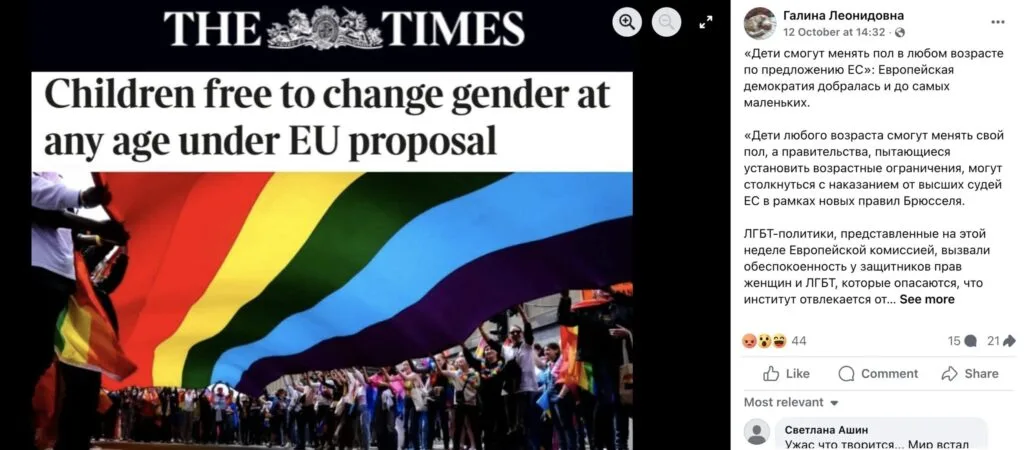In mid-October 2025, information spread on social networks about upcoming changes in European legislation: young residents of the EU would allegedly be allowed to make a transgender transition without age restrictions and without parental permission. We have verified the accuracy of this news.
“Brussels is shocking again: the European Commission has presented the LGBTIQ+ Equality 2026–2030 strategy, according to which even young children will be able to “freely choose” their gender - without parental consent and without medical restrictions. Those who object will face charges of “inciting hatred”, and countries that are not ready to comply risk losing European subsidies.” it says in a post by the Russian-language edition of Austria Today on Facebook. This topic is also actively discussed by other social network users (1, 2, 3, 4). The authors of some posts refer to an article allegedly published by The Times newspaper.

This article actually appeared on the site The Times October 9, 2025. True, its title uses the word “gender”, not “sex”. The text itself is for the most part devoted to criticism of the European authorities in the field of supporting gender self-identification: according to some British activists, this at least relegates to the background, and at most infringes on the rights of women and homosexuals. Their protection from discrimination, such activists believe, should be based on recognition of the importance of biological sex.
Regarding minors, the article states: “Under the [European Commission] proposals, children of any age will be able to transition, and any therapeutic methods aimed at testing the correctness of such a decision will be prohibited. Any government that attempts to set age limits or opposes a move towards equality based on gender rather than sex could face sanctions from the European Court of Justice, which has the power to uphold the supremacy of EU law over national law.”
The European Commission has published a strategy LGBTIQ+ Equality 2026–2030 on its website the day before, October 8. “Self-determination free of age restrictions” is mentioned in this document in the section “Ensuring equal rights across countries.” The authors note that the requirements for changing the gender marker in documents differ in different EU countries. “While some member states have adopted a self-determination model, others are introducing medical procedures that the ECtHR considers may violate human rights. The European Commission will facilitate the exchange of best practices between Member States to support the development of legal gender recognition procedures based on self-determination, free from age restrictions.”
In other words, Brussels considers it preferable to have legislation that allows a person to change the gender marker in their documents simply by submitting an appropriate application (this practice, for example, from 2024 valid in Germany). In some other countries, this requires surgical correction and hormonal therapy. In EU countries that are gradually abandoning such stringent requirements (for example, in the Czech Republic), there remain intermediate stages - in particular, obtaining a certificate from a sexologist based on the results of a many-month diagnosis.
It is noteworthy that a very similar wording about simplifying the legal change of gender marker contained and in a similar strategy of the European Commission for 2020–2025. In both cases, children and minors were not directly mentioned in the relevant sections of the documents. Moreover, in a comment to AFP, a representative of the European Commission specifically noted, that the expression “without age restrictions” used in the text of the strategy does not refer to children: “To avoid misunderstandings: the Commission did not mean minors when it spoke about age restrictions. All the European Court of Human Rights cases mentioned [in the document] in this context concerned adults – some of them over 60 years of age.”
By data specialized organization ILGA Europe, changing your gender marker without age restrictions is now possible in six of the 27 EU countries. At the same time, experts clarify, which includes states where such a decision for minors can only be made by their legal representative - a parent or guardian. For example, in Germany such a mechanism works before the age of 14, after which the teenager can himself request a change in the documents, but for this he must obtain the consent of the parents or a specialized court, as well as provide a certificate of consultation with a specialist.
As for the statement by The Times journalist that any therapeutic methods aimed at checking the correctness of the decision to transition will be prohibited, it is false for two reasons. Firstly, the document itself speaks (and in a completely different section) about the need to ban so-called conversion therapy - unscientific practices that supposedly help cure LGBT+ people. To achieve this, unethical and even dangerous methods are often used, including physical and sexual violence. Secondly, the strategy presented by the European Commission is not a legislative act binding on EU member countries, but a description of the framework policy and recommendations of Brussels in a certain area for the coming years. There are no sanctions for failure to comply. “We fully respect the competence of Member States, including exceptional competence regarding the legal minimum age for legal gender recognition. Any suggestion that the Commission would impose such measures on Member States is simply false." stated at a press conference on October 10, department representative Eva Hrnchirzhova.
Thus, the new strategy of the European Commission does not say that children will be allowed to change gender at any age without parental consent and without consulting a doctor. This text only talks about changing the gender marker in documents - Brussels recommends simplifying the procedure as much as possible. At the same time, minors are not mentioned at all in this section of the strategy, and it itself is not binding for EU states.
Cover photo: Unsplash
Read on topic:
- "Postscience". Sex, gender and gender roles: how ideas about masculinity and femininity are formed in society
- Is it true that Disney encourages employees to sterilize their children?
- Is it true that a Boston hospital performs gender reassignment surgeries on teenagers?
If you find a spelling or grammatical error, please let us know by highlighting the error text and clicking Ctrl+Enter.






